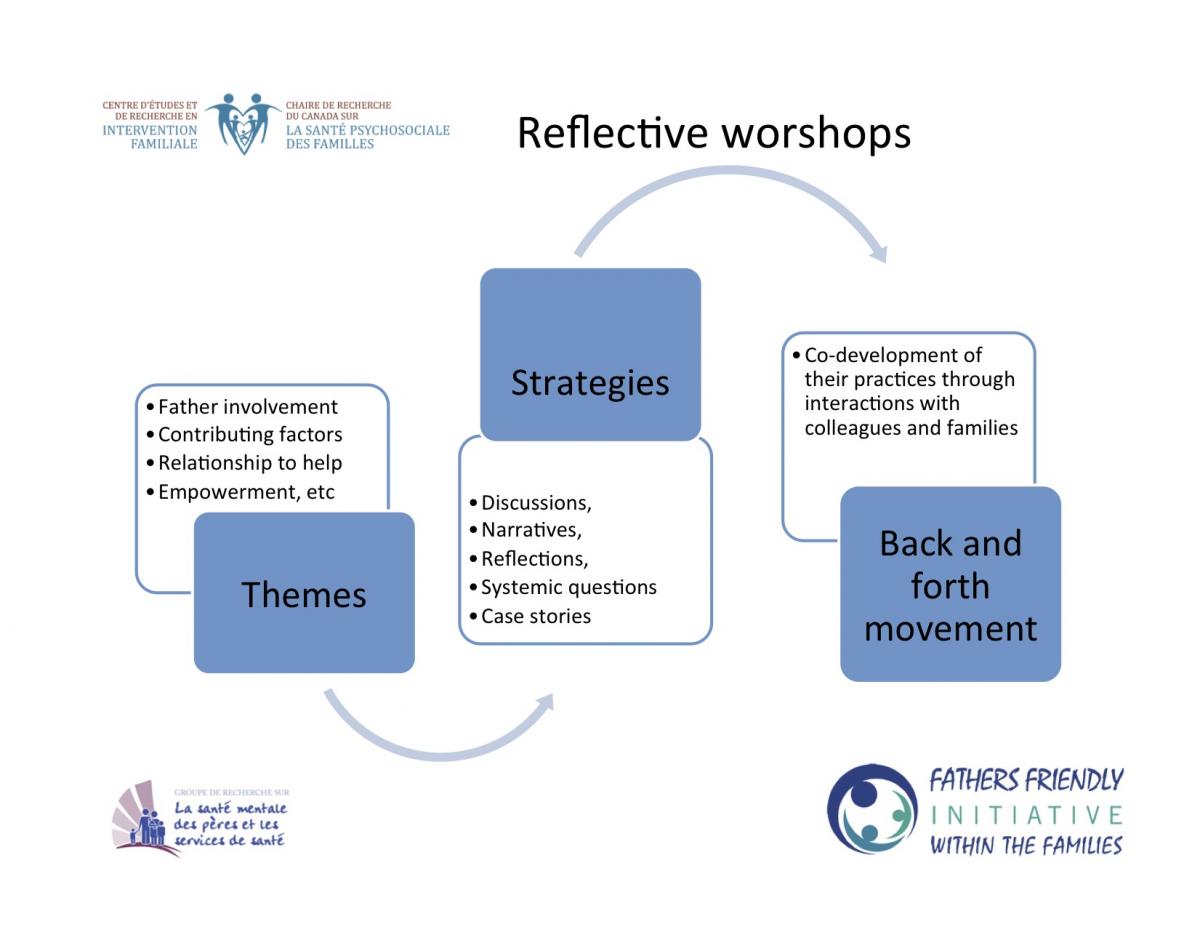The FFIF logic model illustrates the four conceptual approaches at the foundation of the program, namely:
- The bioecological and human development perspective;
- The systemic family approach;
- Empowerment; and
- Reflexive practices.
The bioecological perspective on human development(Bronfenbrenner & Morris, 1998)
What is special about the bioecological perspective on human development (Bronfenbrenner & Morris, 1998) is that it considers that the human relationships that individuals weave with significant people are the driving force behind their development as human beings. Thus, men develop their involvement as fathers through being nurtured by interactions with those close to them, for example, their spouses and family members, but also the health care and social workers whom they meet. The personal characteristics of a father, such as his age, level of education and mental and physical health, influence his development. Similarly, characteristics of his environment, for example, his level of income, immigrant status, his spouse's health and the child's temperament, will also influence this development.
The action hypothesis on which the FFIF is based states that the program will influence the proximal development processes in the lives of fathers (support experiences and the feeling of having choices and information so that they have control over their lives) and, ultimately, mothers (experiences of being involved in a co-parental relationship) and children (developmental, stimulating and protective experiences provided by involved fathers). The conceptual hypothesis of the FFIF is that improving these proximal developmental processes in the lives of fathers will ultimately have effects on the quality of parental adaptation, the exercise of parental responsibilities and the conjugal relationship, which will have a positive impact on children's development (Chamberland & Lacharité, 2007).
The systemic family approach
The systemic family approach suggests considering fathers within families. Any action taken with respect to one of the members will have effects on the others. Front-line health care and social services workers are stakeholders in such family systems owing to the support they give families in the course of their lives. Thus, rather than offering a targeted, one-time program of support for paternal involvement, the FFIF aims to change the beliefs and practices of front-line workers who deal with fathers and their families so as to influence all fathers. Systemic questions accompany the reflections of managers and front-line workers concerning their beliefs and practices, for example: What is your role with respect to fathers? What are your beliefs concerning fathers' contributions to the development of children, mothers and families? What conditions facilitate fathers' inclusion? What are obstacles to it? By gaining awareness of beliefs (generally centred on the importance of mothers for children) underlying program and care for families, and by changing them to include fathers, managers and front-line workers take steps towards lasting changes in practices.
The empowerment model and the participatory approach
The goal of the FFIF is to support relationships woven among professionals from different disciplinary horizons, as well as those developed with families. Development of individuals' and communities' power to take action (empowerment) is promoted (Lebossé & Dufort, 2001). For parents, this means having their experience, capacities and skills acknowledged; being supported in the use of those skills and to develop new ones; and, finally, having the choice and the information necessary to make decisions about their own lives and those of their children. For front-line workers, it means being involved in participatory activities that facilitate collaboration with their colleagues, managers and fathers' environments (Dunst, Trivette & Deal, 1994). They are thus invited to describe their specific experiences, to determine the consequences or effects that a situation can have on them (emotions, thoughts, hopes, actions, etc.) and on others (relationships, perceptions, etc.), to evaluate the nature of these effects, and, finally, to justify these evaluations on the basis of associated values (the things in life that are important to them, for themselves and for others) (Lacharité & Gagnier, 2009).
As advocated by the FFIF, an approach founded on reflexive workshops, linking reflexive discussions with more theoretical exchanges, makes it possible to simultaneously raise front-line workers' awareness of fathers' needs, create the desire to develop their skills, adapt their approach to the real working context, change their beliefs and influence one another (Goudreau & Duhamel, 2003; Granlund & Bjorck-Akesson, 2000; Karlsson, Björk-Akesson & Granlund, 2008; Kelly & Newstead, 2004; Peden-McAlpine, Tomlinson, Forneris, Genck & Meiers, 2005; Tomlinson, Thomlinson, Peden-McAlpine & Kirschbaum, 2002; Lerouche, 2005; Suzie, 1999). The reflexive approach allows front-line workers to review their own practices, and to compare, validate and enrich their experiences in relation to the families they deal with. (See Figure 2.)
Themes
- Paternal involvement
- Contributing factors
- Relationship to support
- Empowerment, etc.
Strategies
- Discussions
- Practice narratives
- Reflection
- Systemic questions
- Case histories
Review
- Co-development of practices through meetings with colleagues and families
Figure 2: The reflexive approach as presented at reflexive workshops





